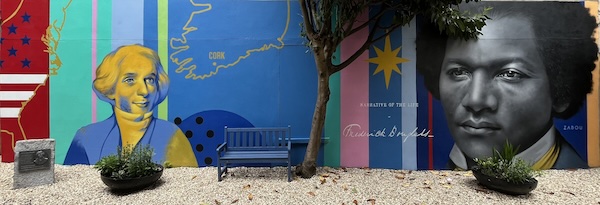Douglass on Religion
After moving to New Bedford, Massachusetts, Douglass was extremely disappointed by the segregation and condescending manner he found in the northern Methodist churches. He joined the African Methodist Episcopal (AME) Zion Church, and, in 1839, became a licensed preacher in the Church. Although Douglass wrote that he looked back at his time in the AME Zion Church with great joy, he did not remain with them for more than a few years, saying that: it consented to the same spirit which held my brethren in chains.
Here are some of Frerick Douglass’ thoughts on religion:
I love the pure, peaceable, and impartial Christianity of Christ: I therefore hate the corrupt, slaveholding, women-whipping, cradleplundering, partial and hypocritical Christianity of this land. Indeed, I can see no reason, but the most deceitful one, for calling the religion of this land Christianity. I look upon it as the climax of all misnomers, the boldest of all frauds, and the grossest of all libels. Never was there a clearer case of “stealing the livery of the court of heaven to, serve the devil in…
I have met many good religious coloured people at the South, who were under the delusion that God required them to submit to slavery, and to wear their chains with meekness and humility. I could entertain no such nonsense as this; and I quite lost my patience when I found a coloured man weak enough to believe such stuff. Nevertheless, eager as I was to partake of the tree of knowledge, its fruits were bitter as well as sweet. “Slaveholders,” thought I, “are only a band of successful robbers, who, leaving their own homes, went into Africa for the purpose of stealing and reducing my people to slavery.” I loathed them as the meanest and the most wicked of men.
I should regard being the slave of a religious master the greatest calamity that could befall me. For of all slaveholders with whom I have ever met, religious slaveholders are the worst. I have ever found them the meanest and basest, the most cruel and cowardly, of all others. It was my unhappy lot not only to belong to a religious slaveholder, but to live in a community of such religionists. Very near Mr. Freeland lived the Rev. Daniel Weeden, and in the same neighborhood lived the Rev. Rigby Hopkins. These were members and ministers in the Reformed Methodist Church. Mr. Weeden owned, among others, a woman slave, whose name I have forgotten. This woman’s back, for weeks, was kept literally raw, made so by the lash of this merciless, religiouswretch. He used to hire hands. His maxim was, Behave well or behave ill, it is the duty of a master occasionally to whip a slave, to remind him of his master’s authority. Such was his theory, and such his practice. Mr. Hopkins was even worse than Mr. Weeden. His chief boast was his ability to manage slaves. The peculiar feature of his government was that of whipping slaves in advance of deserving it. He always managed to have one or more of his slaves to whip every Monday morning. He did this to alarm their fears, and strike terror into those who escaped. His plan was to whip for the smallest offences, to prevent the commission of large ones. Mr. Hopkins could always find some excuse for whipping a slave. It would astonish one, unaccustomed to a slaveholding life, to see with what wonderful case a slaveholder can find things, of which to make occasion to whip a slave.
Frederick Douglass added an appendix concerning his view on religion to his autobiography. Click the button to download the PDF.
